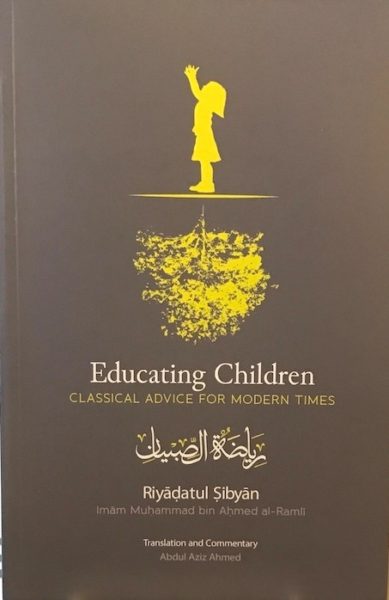Product Description
Paperback
Author: Imam Muhammad bin Ahmed al-Ramli,
Translation & Commentary: Shaykh Abdul Aziz Ahmed Fredericks,
Published by DTI (Dar al-Turath al-Islami), South Africa
The author of the poem Riyādatul Sibyān, is the famed 16th Century jurist, Imām al-Ramli.
Its translator, Abdul Aziz Ahmed, is an experienced teacher who studied both classical Islamic texts with renowned scholars, and modern psychology and pedagogy. – More about the translator below, scroll to bottom –
———————————————————-
Table of Contents :
—Translator’s Introduction,
——Imam Muhammad bin Ahmed al-Ramli,
——Abdullah Ba Saudan and His Commentary,
——Riyadatul Sibyan – ‘Training Boys or Educating Children,’
—[1]. Author’s Foreword (Part One),
——Commentary,
——Reflection – What is Education ?
——Discussion.
—[2]. Author’s Foreword (Part Two),
——Commentary,
——Reflection – What are the Roles of the Mother and Father ?
——Discussion.
—[3]. The early years – suckling,
——Commentary,
——Reflection,
——Discussion,
———What is it like to adopt a child ?
—[4]. The early years – eating,
——Commentary,
——Reflection,
——Discussion,
———How important are mealtimes to the process of a child’s social and physical development?
———What western customs should we encourage our children to adopt?
—[5]. The early years – living simply,
——Commentary,
——Reflection,
——Discussion,
———How do we encourage our children to follow a heathy diet?
—[6]. The age of discrimination,
——Commentary,
——Reflection,
——Discussion,
———How can we protect the chastity of our children & inculate the values of modesty?
—[7]. Developing the intellect – adherence to the Qur’an,
——Commentary,
——Reflection,
——Discussion,
———How can we instil the Qur’an in the upbringing of our children ?
—[8]. Developing the intellect – keeping the mind busy,
——Commentary,
——Reflection,
——Discussion,
———What ways can we develop the mind of a child ?
———In bringing up children, can watching television, playing video games and other technology be considered a cultural norm (‘urf)?
—[9]. Developing the intellect – learning consequences,
——Commentary,
——Reflection,
——Discussion,
———What role does hitting children play in discipline and child development?
—[10]. Developing the intellect – the need for relaxation,
——Commentary,
——Reflection,
——Discussion,
———How can we give our children some time for relaxation and fun that is still halal and will bring about development benefits ?
———Should girls be encouraged to pursue an interest in sports
—[11]. Developing the intellect – the need for gentleness and good role models,
——Commentary,
——Reflection,
——Discussion,
———Can we be too gentle with our children?
—[12]. Keeping good company,
——Commentary,
——Reflection,
——Discussion,
———Is it wrong to ‘manipulate’ friendship groups to ensure your child has good role models?
—[13]. The etiquette of speech,
——Commentary,
——Reflection,
——Discussion,
———How can young adults be encouraged to talk with their parents?
—[14]. Good manners,
——Commentary,
——Reflection,
——Discussion,
———How do we limit the influence of mass advertising ?
—[15]. Behaviour with peers,
——Commentary,
——Reflection,
——Discussion,
———How should parents deal with teenage children who don’t want to participate in ‘family activities’ ?
—[16]. Disciplining the young person,
——Commentary,
——Reflection,
——Discussion,
———What ways can we discipline a child ?
—[17]. Avoiding bad characteristics,
——Commentary,
——Reflection,
——Discussion,
———The sexualisation of modern society has served to de-sensitise young people on issues and topics that would have been previously considered taboo. How do we deal with this when raising young adults ?
—[18]. Attaining maturity,
——Commentary,
——Reflection,
——Discussion,
———What pressures do young people feel growing up as Muslims in the West ?
———How can parents keep the door of communication open with young people who are growing away from the religious, cultural and family norms?
—[19]. Final remarks,
——Commentary,
——Reflection.
—Glossary,
—Bibliography,
—People mentioned in the text.
———————————————————-
– More about the translator –
Professor Shaykh Abdul Aziz Ahmed Fredericks :
The compiler of this book was born in Nottingham where he completed his schooling before moving to Leicester where he completed a BEd degree in primary education specialising in Language Arts. He then went on to carry out post-graduate studies in Education in various universities including London University Institute of Education, Strathclyde University, the Open University and SOAS. He has published a number of articles on education and designed the curriculum of Islamia School London at the time it achieved Voluntary Aided Status. The curriculum was published by the Islamia Schools Trust. He has worked as a teacher, Head Teacher and School Prinicipal in England, Scotland, South Africa, Saudi Arabia and USA. As an educational consultant, he has worked on projects in Turkey, Yemen, Kenya, Jordan and South Africa. He has a special interest in special educational needs and additional support and currently works full time as Additional Support Manager for a local education authority. He has worked as a policy advisor for several education authorities and schools including the UK Madrasa network.
His Islamic Studies took him to various parts of the world where he studied under many prominent traditional scholars. They include Ahmed Mashur al-Haddad under whom he studied in Jeddah, Abdul Rahman al-Khitamy in Kenya and Imam Fethullah Gulen in Turkey. He translated the ‘Essentials of Islam’ by Ahmed bin Zayn al-Habashi and Forty Hadith on the Quran by Mullah ‘Ali al-Qari, Riyadatul Sibyan of Imam al-Ramli and is currently working on translations of al-Nasaih al-Dinniya of Imam al-Haddad. Shaykh Abdul Aziz uses his teaching experience and interest in special needs in his dawah work calling people to Allah. Many of the courses he teaches use modern teaching methods and an interactive style. He has taught various books around the world including ‘The Book of Assistance’ of Imam al-Haddad and the ‘Forty Hadith’ of Imam al-Nawawi.
His interest in special educational needs drove him to co-found the organisation Islamic Texts for the Blind (Kitaba). The Islamic Texts for the Blind produces books in Braille and audio format, provides accessible online classes and has an accessible web site with Islamic resources and translations. They work with government and voluntary organisations to meet the religious and cultural needs of disabled Muslims.

Reviews
There are no reviews yet.